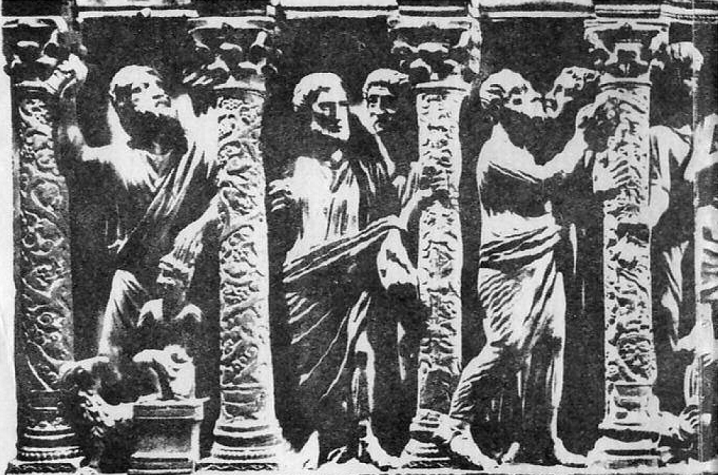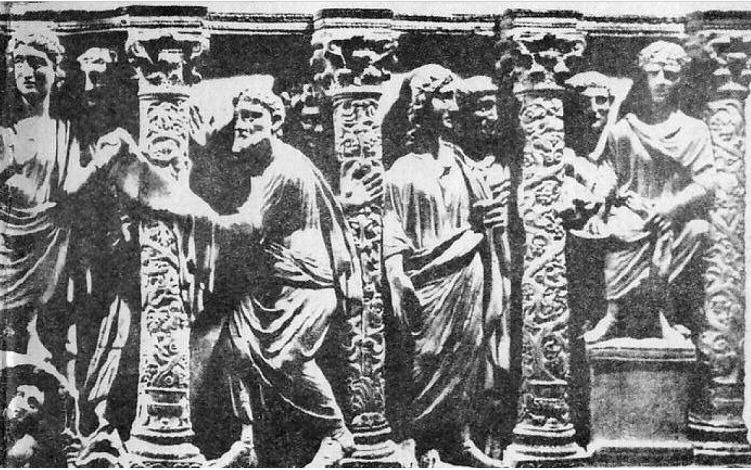Written by W.G. Finlay


Posted and images added by Jackie
CHAPTER THREE
Mercy unto you, and peace, and love, be multiplied. Beloved, when I gave all diligence to write unto you of the common salvation, it was needful for me to write unto you, and exhort you that ye should earnestly contend for the faith which was once delivered unto the saints. Jude 1:2,3
If one considers the Epistles of James, John and Jude, one cannot escape the conviction that these men were aware of the specific adversaries who were at work perverting the faith which the Patriarchs of the Old Testament had in God. That Jude found it an “urgent necessity” (N.E.B) to appeal to the people to join in the struggle in “defence of the faith which God entrusted to His people once and for all”, is a clear indication
That forces were at work which were destroying the total conviction which the men of the Old Testament held concerning the LORD and His Promises. The Promises which were made were national and the heirs of those Promises believed and knew that they would be fulfilled, if for no other reason than that the Integrity of the Holy Name of the LORD in this.
This was the faith that was being undermined and as one looked at priority given to “converts” and the emphasis placed in the individual of all nations, one can surely appreciate the concern expressed by those who had walked with – and listened to, the Lord Jesus Christ. He expounded the Truth of God, which bound up in the Integrity of His Name. They had heard Him, after His Resurrection, commission them –
Then said Jesus to them again, Peace be unto you: – as my Father hath sent me, I am not sent but unto the lost sheep of the house of Israel. (Matthew 15:24) – even so send I you. (John 20:21)
– despite this, they now began to hear other doctrines preached by others who were not qualified to teach what the Lord had taught. The Lord has said: “And ye also shall bear witness, because ye have been with me from the beginning”. (John 15:27)
and, others who did not measure up to the qualifications, were setting themselves up as “authorities”.
These men listened with dismay as the “converts” ridiculed their stand on the continuity of Israel that “genealogies” were irrelevant and that the Law, which was Israel’s “wisdom and understanding in the sight of the nations” (Deuteronomy 4:6)
should be classified “as unprofitable and in vain” (Titus 3:9}
“But avoid foolish questions, and genealogies, and contentions, and striving about the law; for they are unprofitable and vain” (Paul’s epistle to) Titus 3:9
Paul was never ordained and qualified to be an apostle of Yahshua Messiah. Yet, he claims the Law of Yahweh does not count anymore? He, Paul, who never made a valid prophecy. And furthermore, there are NO thirteen apostles. Period! (added by Jackie)
We continue.
The Integrity of the Name of the LORD vested in Israel national purpose was becoming an ever-diminishing factor as doctrines, which were never taught by the Lord, began to make their appearance. Thus, as one reads the history of events as they developed during the first years of the Christian dispensation, one finds that the “faith once delivered to the saints” had receded until finally replaced by doctrines, which in His Revelation to John, the Lord rejected out of hand.
It would, of course, be contended that the above statement is the by-product of an over-active imagination and that under the guidance and directive of the Holy Spirit, the things that were done – the proselytising of all and sundry into “the universal church of Christ”- was the ultimate Purpose. It is strange that the LORD God made a nation when He could have made a church, and it is equally strange that He declared His Purpose as a national and not an ecclesiastical one. It is, strange too, that the Lord Jesus Christ, the Son of God Himself, the Word Incarnate in the flesh, should tell His Apostles to feed His sheep whom He had identified as Israel at the commencement of His Ministry (Matthew 15:24) and yet men had the temerity to imply that all this meant absolutely nothing. The lost sheep of the house of Israel, according to Peter, were scattered throughout Pontus, Galatia, Cappadocia, Asia, and Bithynia (1st Peter 1:1) and yet one reads:
”Now when they had gone throughout Phrygia and the region of Galatia, and were forbidden of the Holy Ghost to preach the word in Asia. After they were come to Mysia, they assayed to go into Bithynia: but the Spirit suffered them not.” (Acts 16:6,7)
It should be noted that the “they” who were forbidden by the Holy Spirit, were not the Apostles, but Paul and Timothy – Timothy who Paul circumcised (Acts 16:3) despite his contention that obedience to the Law indicated that he had “fallen from grace” Galatians 5:2-4. The prohibitions of the Holy Spirit in his instance speaks volumes to those who have ears to hear.
THE WARNINGS OF THE LORD JESUS CHRIST
At the commencement of His Ministry, the Lord Jesus Christ warned: Beware of false prophets, which come to you in sheep’s clothing, but inwardly they are ravening wolves. Ye shall know them by their fruits. Do men gather grapes of thorns, or figs of thistles? (Matthew 7:15,16).
This message, it will be recalled, was not aimed at the multitudes but rather directed to His disciples.
- “And seeing the multitudes, he went up into a mountain: and when he was set, his disciples came unto him: he opened his mouth, and taught them, saying”,(Matthew 5:1)-
The word “disciple”, as has been mentioned previously, indicating “one who is instructed or a learner” They were therefore warned to be on the alert for those who pretended to be His “sheep” but whose impact could be equated with the “ravening wolves.”
As His Ministry drew to its close, He again warned,
- And Jesus answered and said unto them, Take heed that no man deceive you. For many shall come in my name, saying, I am (the) Christ; and shall deceive many. Matthew 24:5 –
which was even more specific than His earlier warning. In this instance, He warned that many would come, using an acknowledgement of His Name – acknowledging that He was THE Christ – to gain credibility among the people and, having gained their confidence, they would then proceed to deceive them with their doctrines which made His teachings null and void. When did this happen?
While many are of the opinion that these warnings were intended for a much later age, it has become the practice to ignore the fact that they must have had credibility among those to whom the Lord directed them. All Twelve Apostles had heard the Lord’s warning and Peter, who was given charge over the Apostolic Band, would surely be on the alert for and contend against anyone who appeared and taught contrary to what the Lord had taught. Did he, however, do this or was the Lord’s choice of Peter a bad selection? This question is asked against the picture of Peter, the man as he is painted in the Gospels and the Epistles – a picture which presents him as a hesitant, uncertain man who lacked faith,
- “And immediately Jesus stretched forth his hand, and caught him, and said unto him, O thou of little faith, wherefore didst thou doubt?” (Matthew 14:31)
One, who despite his presence in the company of the Lord was “unconverted”,
- “But I have prayed for thee, that thy faith fail not: and when thou art converted, strengthen thy brethren.” (Luke 22:32)
one, who denied the Lord using curses and oaths in his denial,
- “But he began to curse and to swear, saying, I know not this man of whom ye speak.” (Mark 14:71)
and one, who failed to believe the evidence of the Risen Lord.
- “Then went in also that other disciple, which came first to the sepulchre, and he saw, and believed”.(John 20:8)
Did the Lord make a bad choice in Peter and, realising this, did He them appoint another to compensate for Peter’s inadequacies? This writer (= Dr. William G. Finlay, and I agree, Jackie) does not believe that this was so – what in point of fact has happened is that Peter and the chosen Apostles have been made to appear to be a bad choice by writers who saw the Commission of the Apostles,
- “But go rather to the lost sheep of the house of Israel”.(Matthew 10:6)
- “Then said Jesus to them again, Peace be unto you: as my Father hath sent me, even so send I you” (John 20:21)
as conflicting with the then emerging theology of proselytism. The Commission of the Apostles in the context of Israel would be at variance with the developing “Gentile church” and just as the Pharisees used the “smear” technique to discredit the Lord Jesus Christ, one finds a similar technique used to discredit the Apostles.
EARLY FORM OF CENSORSHIP
An instance of the “smear” technique is clearly in evidence if one considers the historical data on attempts, to force Christian thinking into prescribed channels. Dr. William Smith, in his Dictionary of the Bible, contended that the first attempt to control Christian thinking was made in A.D 140 when Marcion, a Roman citizen of Jewish extraction, presented ten epistles of Paul and a mutilated version of Luke’s Gospel as the only documents “worthy and profitable for doctrine”. All others including the Revelation of the Lord Jesus Christ, were labelled as “spurious” – Marcion’s contention being that the Apostles were “corrupters of the truth”. As far as is known, Marcion’s aspersions on the selection by the Lord of His Apostles were never challenged, which would indicate something of the thinking which had been injected into men at that early stage. As the allegations were never challenged and as Marcion’s “canon” was apparently accepted by some – evidence of its popularity is lacking – one is left with the impression that the Christianity of that time placed its faith in the integrity of ecclesiastical sanction rather than in the teaching of The Christ and His Apostles.
Resulting from this situation, it is small wonder that history records the emergence of an ecclesiastical dictatorship which appropriated to itself the right to censor all writings and to declare as “heresy” anything that was contrary to their opinion. One is, of course, accustomed to reading of much Christian literature destroyed in the Roman persecutions and while it is certainly not denied that this did take place, the scale on which it took place might not be so great as is popularly depicted. For instance, and according to the Codex Justinianus, the Emperors Constantine, Theodosius, and Valentinian prescribed the death penalty on anyone found in possession of works which were considered to be opposed to the Christian faith, and instances of burning “blasphemous” works are recorded. So then, while Roman persecutions are blamed for the loss of many early Christian writings, the ecclesiastical hierarchy of the time is also to blame.
Although not destroyed but certainly precluded from inclusion with the 66 Books which the Carthage Council Canonised and which comprise the Bible today, one finds the writing of Clement singularly interesting. While considerable controversy surrounds Clement – some hold that he was the Clement of Paul’s epistle to the Philippians.
- “And I intreat thee also, true yokefellow, help those women which laboured with me in the gospel, with Clement also, and with other my fellow labourers, whose names are in the book of life”. (Philippians 4:3)
While other hold that he was the Bishop of Rome – while this is indeed so, the “Clementine writings are interesting, in that they present Peter in a different light than is presented in the Gospels”.
It may be recalled that in the 8th chapter of the Acts one has the story of one Simon the sorcerer, who is generally designated as Simon Magus.
- “But there was a certain man, called Simon, which beforetime in the same city used sorcery, and bewitched the people of Samaria, giving out that himself was some great one:To whom they all gave heed, from the least to the greatest, saying, This man is the great power of God.” (Acts 8:9-10)
This Simon listened to the teaching of Philip and witnessed the things which he did and, as is told in verse 13
- “Then Simon himself believed also: and when he was baptized, he continued with Philip, and wondered, beholding the miracles and signs which were done.”
The account then continues with Peter and John entering the picture, and when they had laid hands on the people in verse 17
- “Then laid they their hands on them, and they received the Holy Ghost”.
Philip, of course, did no such thing in Samaria and while Simon was amazed at the things which Philip had done, he was utterly dumbfounded at what was done when Peter and John came on to the scene. He immediately associated the Power of the Holy Spirit with the Apostles (even though Philip as an Apostle did no such thing as Peter and John) and the narrative continues that he attempted to buy the rank of “Apostle” which, he believed, would give him the same power as Peter and John, of course, rejected both the man and his money – a rejection which has an effect in Simon which Peter described:
- For I perceive that thou art in the gall of bitterness, and in the bond of iniquity” (verse 23)
Simon’s plea for intercession, Peter appears to have turned his back on the man. This is the last mention of Simon in the Bible but if one considers the Clementine writings, one finds this Simon presented in a different light and Peter’s rejection of him seen, as the way in which he considered his trust.
In the first instance, in the Clementine Recognitions 3:39, Simon Magnus is called “a chosen vessel for evil” while Clementine Homilies 17:13-20, one reads of an argument between Peter and Simon Magus which centred, as one can appreciate, on Peter’s status as a leader of the Apostles. Simon Magus accused Peter of not understanding that physical perceptions of the Commission of the Lord were untrustworthy and totally inferior to the supernatural vision* which he, Simon Magus had, had of the Lord, thus making his knowledge superior to that of Peter’s. Peter’s answer to this claim was both logical and valid, in that Peter is reported to have said: Why should Christ have remained with His disciples and instructed them a whole year, if it were possible for one to be made a teacher at once by vision? If, however, thou hast been made an apostle after having been instructed by him in a brief and momentary manifestation, then preach his words, love his apostles, and fight not against me who lived in his society.” Notwithstanding the flaws in this account, namely the statement that the Lord instructed His Apostles for one year, Peter’s contention it was illogical that the LORD having spent so much time and endavour instructing His Apostles only to discard them, and appoint others by supernatural vision, is still valid. Whether, or not one accepts the Clementine writings as authentic, it cannot be disputed that Peter’s argument against the claim of Simon Magus has a familiar ring when it is realised that teachers other than the Christ-appointed Apostles did arise, and claim supernatural authorisation in the Name of Christ. And they were preferred over those whom the Lord commissioned. This is precisely the fulfillment of the warnings which the Lord gave to His disciples.
(Footnote* Oh, Simon Magus could very well had a vision, but the vision was not given by Yahshua Christ, added by Jackie)
In another censored work – in that it is projected as a “pseudo-epistle – one finds Peter expressing concern to James over the fact that someone was using his name as an endorsement for the doctrine that the Law had been invalidated. In the so-called pseudo-epistle of Peter to James, Peter draws attention to the way in which is name was being used: “I see already the beginning of evil: for some of the Gentiles, have rejected the doctrine taught by me, which are in harmony with the Law, having adopted an anti-legal and fabulous doctrine from the man who is my enemy. Nay, some have attempted, even during my lifetime, to wrest my words, by various interpretation, to the subversion of the Law, as if I also were that I did not openly express it, of the same opinion.” So then in this writing, Peter claims to have an “enemy” who had resorted to a propaganda campaign in which it was claimed that he, Peter, supported the doctrine that the Law had been superseded by the doctrine of grace.
To be continued Part 4, first part of chapter 4





4 thoughts on “Robbing Peter to Pay Paul – Part 3”
So, there was a disruption or hijacking of the message in the beginning. I wondered about that. A complete lack of information. Then came the Catholic church with their deception and their god on earth in the form of a human. Later on and in present times, atheists claim that Christ never existed. The Crusades carried out for no reason??? The fake Prophet Mohammad also involved in this bloodshed for no reason??? And the reasons and the actions continue. A man or men that wish to see all humans serve them as if they were special in some way. It’s funny in a way. They are like spoiled children.
Yes, like spoiled children and then some. Madeleine Albright, the jewess who recently died, remember, she said something like 500,000 children dead was worth punishing of Saddam?
Where jews are involved, sooner or later, the chaos and trouble they have caused will get devilish. The jews infiltrate, and eventually they take over to control everything lock, stock, and barrel. All kinds of merchandise, one merchant, the jew.
We had Covid, however, that it is not that important anymore; now it is the war in Ukraine which “is far worse”, according to the jews. “Forget Covid”
What’s up next?
Locusts
Parasites as well